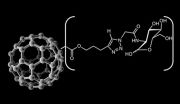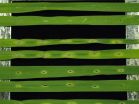(Press-News.org) Materials resulting from chemical bonding of glucosamine, a type of sugar, with fullerenes, kind of nanoparticles known as buckyballs, might help to reduce cell damage and inflammation occurring after stroke. A team from the Max Planck Institute in Germany has tested this on mice, opening the door to potential new drugs for the cerebrovascular accident.
The majority of stroke occurs when the blood vessels that reach the brain are blocked by clots or fatty deposits which decrease the flow of blood towards its cells. It is then that an ischemic attack occurs, a pathology that leads to the degeneration of neurones, which can be fatal and not many drugs can treat.
Now, German and Swiss scientists have discovered that the combination of two substances help to reduce inflammation and the brain volume affected after a cerebrovascular accident. This is glucosamine, an amino sugar commonly used to treat arthritis and arthrosis; and certain derivatives of fullerenes, hollow and spherical structures formed by many carbon atoms.
Before now it was known that the fullerenes capture chemical radicals well which makes them act as neuroprotective agents, while the glucosamine brings down the inflammation.
What the researchers have done is chemically bond the two compounds to produce what is known as 'glyconanoparticles'. These have subsequently been administered to laboratory rats which then had a cerebrovascular accident induced.
The results, published in the journal 'Experimental Neurology', conclude that this combination of fullerene derivatives and glucosamine reduces cell damage and inflammation after a stroke, according to the MRI scans of animal brains and the improvement of their neurological symptoms.
"Our study confirms that it is possible to couple fullerenes with sugars in order to combine their protective effects and in this way, to obtain new materials which may help to prevent and to treat Stroke," says Guillermo Orts-Gil, a Spanish researcher at the Max-Planck Institute of Colloids and Interfaces (Germany) and co-author of the research.
"Although the present study was carried out on mice, the results indicate that these sweet buckyballs are potential new drugs for treating Stroke also in humans. However, this must be taken with caution, since what works in mice does not necessarily will work in the same way in humans," declared Orts-Gil.
This work is the continuation of another previous piece of research, published last year in the journal 'Nano Letters', in which the researchers also confirmed that a protein called E-selectin, linked to the chain of events that occur during a stroke, is distributed throughout the brain and not only in the area where the stroke originates, as previously thought.
INFORMATION:
References:
Felix Fluri, Dan Grünstein, Ertugrul Cam, Udo Ungethuem, Florian Hatz, Juliane Schäfer, Samuel Samnick, Ina Israel, Christoph Kleinschnitz, Guillermo Orts-Gil, Holger Moch, Thomas Zeis, Nicole Schaeren-Wiemers, Peter Seeberger. "Fullerenols and glucosamine fullerenes reduce infarct volume and cerebral inflammation after ischemic stroke in normotensive and hypertensive rats". Experimental Neurology 265:142-51, marzo de 2015.
Tracy D. Farr, Chian-Hui Lai, Dan Grünstein, Guillermo Orts-Gil, Cheng-Chung Wang, Philipp Boehm-Sturm, Peter H. Seeberger, Christoph Harms. "Imaging Early Endothelial Inflammation Following Stroke by Core Shell Silica Superparamagnetic Glyconanoparticles That Target Selectin". Nano Letters 14 (4): 2130-2134, 2014.
Harvesting fire-killed trees is an effective way to reduce woody fuels for up to four decades following wildfire in dry coniferous forests, a U.S. Forest Service study has found.
The retrospective analysis, among the first to measure the long-term effects of post-fire logging on forest fuels, is published in the journal Forest Ecology and Management.
"Large wildfires can leave behind thousands of acres of fire-killed trees that eventually become fuel for future fires. In the past, post-fire logging has been conducted primarily to recover economic value from those fire-killed ...
Loneliness may be a fundamental part of the human condition, but scientists have only recently begun exploring its causes, consequences, and potential interventions. A special section in Perspectives on Psychological Science, a journal of the Association for Psychological Science, aims to bring these strands of inquiry together, presenting a series of articles that review the current state of scientific research on loneliness.
The section, edited by psychological scientist David Sbarra of the University of Arizona, investigates loneliness across multiple levels, from ...
CHESTNUT HILL, MA (March 12, 2015) Targeting deadly, drug-resistant bacteria poses a serious challenge to researchers looking for antibiotics that can kill pathogens without causing collateral damage in human cells. A team of Boston College chemists details a new approach using a "warhead" molecule to attack bacteria -- and spare healthy human cells -- by targeting a pair of lipids found on the surface of deadly germs, according to a report today in the journal Nature Communications.
The new strategy required the researchers to develop a novel type of "warhead molecule" ...
Study links oddly shaped hippocampus to poor long-term memory in former marijuana users
The longer teens used cannabis, the more abnormal the hippocampus as adults
Former users perform 18 percent worse on long-term memory test
Cannabis affects short and long-term memory
CHICAGO --- Teens who were heavy marijuana users - smoking it daily for about three years -- had an abnormally shaped hippocampus and performed poorly on long-term memory tasks, reports a new Northwestern Medicine study.
The hippocampus is important to long-term memory (also known as ...
A team of scientists from the John Innes Centre (JIC), the National Institute of Agricultural Botany (NIAB) and The Sainsbury Laboratory (TSL) have successfully transferred a receptor that recognises bacteria from the model plant Arabidopsis thaliana - a dicot, to wheat - a monocot. They showed that the receptor can trigger a defensive response and confers increased resistance to bacterial disease. The research findings demonstrate that the signalling pathways or circuitry downstream of the receptor are conserved between evolutionary distant monocots and dicots.
Drs Henk-jan ...
Researchers from ZSL and the Shaanxi Normal University, Xi'an, surveyed 43 farms in China and worked with the Shaanxi Province Fisheries Office to investigate the Chinese giant salamander farming industry. They found that, although only a decade old, the industry houses millions of animals and is a major contributor to the Chinese rural economy. The farming industry however, poses a number of threats to the Chinese giant salamander, but also has potential to benefit the species.
Wild salamanders are illegally poached to supplement farmed populations which often do not ...
The indoor air quality in nursing homes has a serious effect on the lung health of elderly residents, according to the findings of a new study.
The study, which is published online today (12 March 2015) in the European Respiratory Journal, is the first to detail the negative effects of poor air quality in nursing homes across several countries.
Researchers from the EU-funded GERIE research project collected data on five indoor air pollutants: PM10, PM0.1, formaldehyde, NO2 and O3. These pollutants come from a range of sources including heaters, building materials, ...
A comprehensive programme providing older people at risk of dementia with healthy eating guidance, exercise, brain training, and management of metabolic and vascular risk factors appears to slow down cognitive decline, according to the first ever randomised controlled trial of its kind, published in The Lancet.
In the Finnish Geriatric Intervention Study to Prevent Cognitive Impairment and Disability (FINGER) study, researchers led by Professor Miia Kivipelto from the Karolinska Institutet in Stockholm, Sweden, National Institute for Health and Welfare in Helsinki, and ...
DURHAM, N.C. - Despite legal and ethical mandates for disclosure, results from most clinical trials of medical products are not reported promptly on a registry specifically created to make results of human studies publically available, according to Duke Medicine researchers.
Among all clinical trials of medical products, those funded by industry were the most likely to be publicly disclosed in a timely fashion, but even then, compliance was poor. Research funded by the National Institutes of Health and academic institutions lagged further, according to findings published ...
New research has shown that patients having heart surgery do not benefit if doctors wait until a patient has become substantially anaemic before giving a transfusion.
In the UK, about half of all patients having cardiac surgery are given a red blood cell transfusion after the operation, using up to ten per cent of the nation's blood supply. The proportion of patients having a transfusion is high because blood loss and severe anaemia are common after cardiac surgery and transfusion is the preferred treatment. Blood loss causes anaemia which doctors detect by measuring ...


